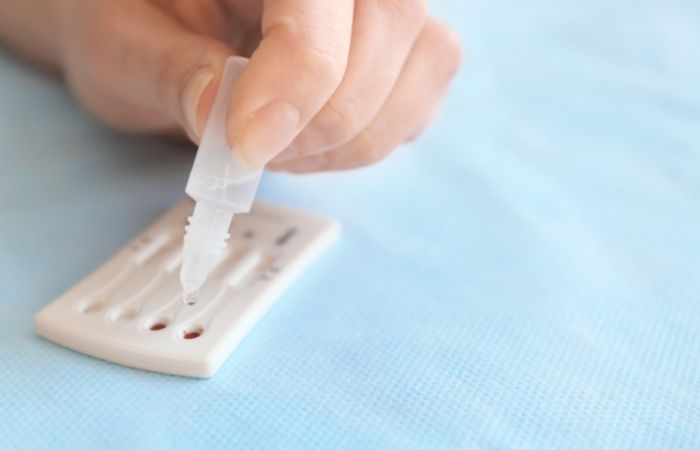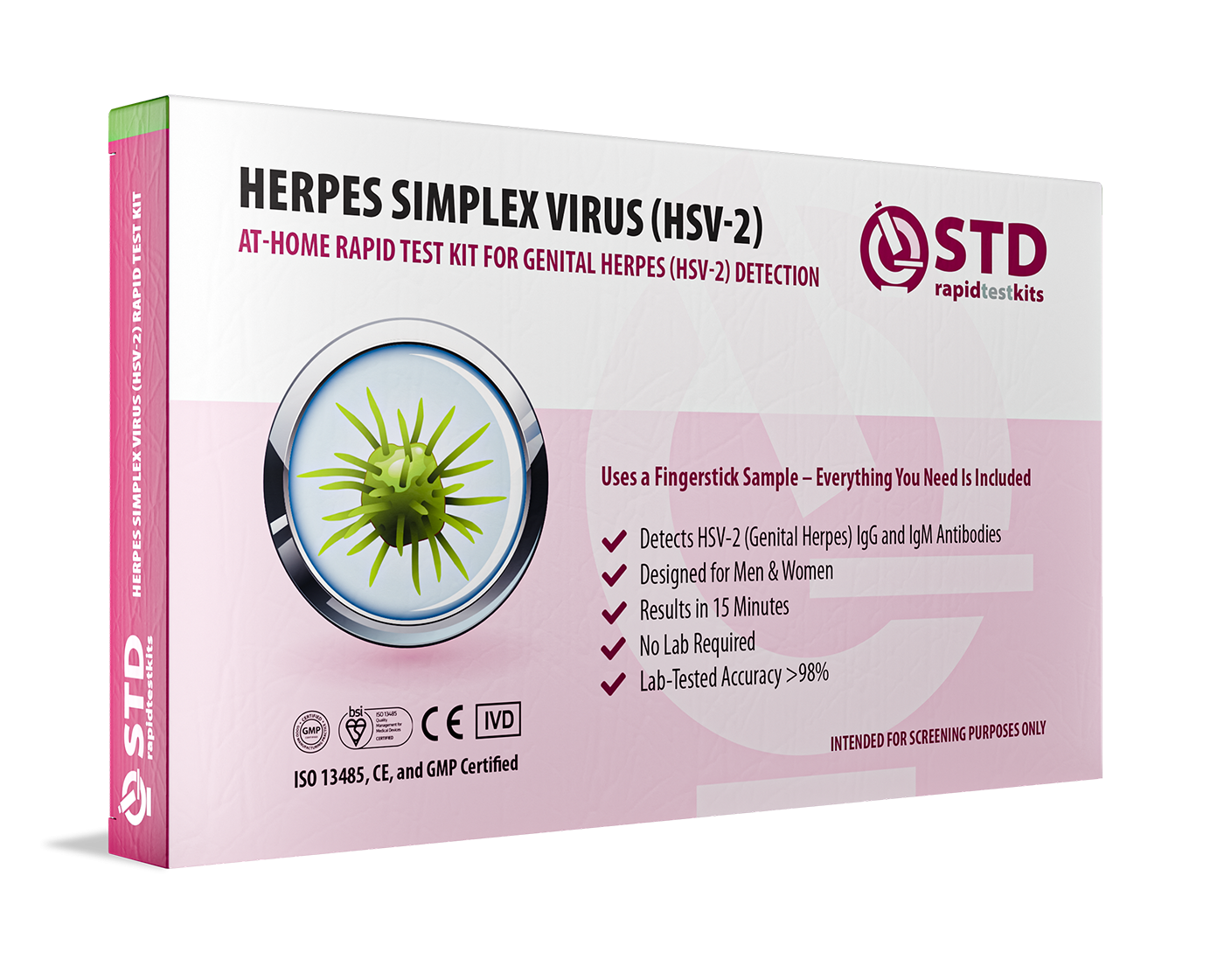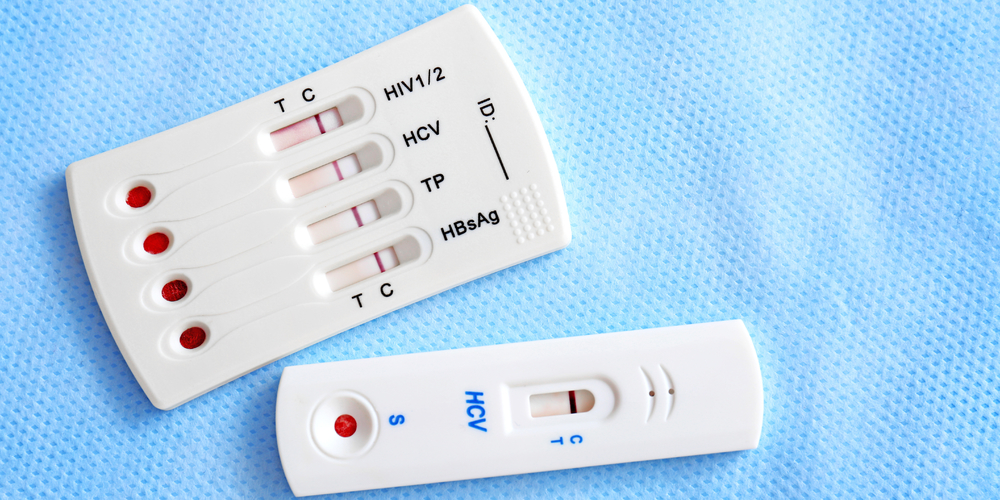You Can Now Test for Herpes in Your Bedroom!
What Is a Home Herpes Test Kit?
Simply put, a home herpes test kit allows you to check for the herpes simplex virus (HSV-1 and HSV-2) in the privacy of your own space. These kits usually use a small blood sample to detect antibodies that your body produces in response to a herpes infection. Most reputable brands offer CLIA-certified lab processing and results you can access online.
There are two main types of herpes tests available at home:
- Blood Test: Detects herpes antibodies (IgG), usually accurate 4–6 weeks after exposure.
- Swab Test: Rarely used at home, as it requires sampling an active sore, more common in clinics.
These kits come with detailed instructions, prepaid return packaging, and access to discreet digital results. Some even include telehealth follow-ups if your result is positive.

People are also looking for: Is there a cure for Herpes?
Why People Choose to Test at Home
There’s a reason “herpes” and “panic spiral” often appear in the same Google search history. Fear of judgment, lack of access to clinics, or simple embarrassment drives many to delay getting tested, or worse, to avoid it altogether. But at-home testing changes the emotional math.
Here’s why more people are turning to these kits:
- Privacy: No awkward conversations, no waiting rooms, no nurse asking you how many partners you’ve had.
- Convenience: Order online. Test when you’re ready. Get results from your phone.
- Control: Empowerment starts with information. You’re the one choosing how and when to get answers.
For many, it’s about dignity. It’s about not letting fear or shame call the shots. And when done right, at-home testing provides just as much peace of mind as an in-person lab visit.
How Herpes Test Kits Work (Step-by-Step)
Testing at home doesn’t mean cutting corners, it means cutting anxiety. Here's what to expect from most reputable at-home herpes test kits:
- Order the kit: Choose a trusted brand and have it discreetly delivered to your door.
- Collect your sample: Most require a quick finger prick using a lancet. It’s a small blood drop, not a horror movie.
- Send it back: Use the prepaid mailer included in your kit to send your sample to a certified lab.
- Get your results: Typically available in 2–5 days via a secure portal or app.
Some kits offer optional follow-up counseling or referrals for antiviral treatment if you test positive. Look for brands that offer this kind of support, you deserve more than just a test result.
Accuracy and Limitations of At-Home Herpes Tests
Let’s get real: no herpes test, home or clinical, is perfect. The most common home kits use IgG antibody testing, which is reliable but comes with caveats. False positives can occur, especially if your antibody levels are borderline or if you’re recently exposed and haven’t built up detectable levels yet.
Here’s what you should know about test accuracy:
- Window Period: Antibodies take time to develop. Most experts recommend testing 4–6 weeks after a possible exposure.
- Type-Specific Results: Look for kits that distinguish between HSV-1 (oral) and HSV-2 (genital).
- Sensitivity: Good kits are 90–98% accurate when used after the window period, but always follow up with a clinician if your results confuse you.
According to the CDC, routine herpes testing isn’t recommended for everyone, but if you have symptoms, a partner with herpes, or just want peace of mind, an at-home kit can be a powerful first step.
Check Your STD Status in Minutes
Test at Home with RemediumOral Herpes Test Kit

 For Men & Women
For Men & Women Results in Minutes
Results in Minutes No Lab Needed
No Lab Needed Private & Discreet
Private & DiscreetOrder Now $33.99 $49.00
Statistical Insights: Herpes Is More Common Than You Think
Let’s kill the shame with some numbers. Herpes isn’t rare, it’s ridiculously common. According to the World Health Organization, more than 3.7 billion people under age 50 have HSV-1, and over 491 million people worldwide live with HSV-2. In the U.S. alone, the CDC estimates about 1 in 6 adults have genital herpes.
So why don’t we talk about it? Because stigma makes people feel isolated, like they’re the only one. But herpes isn’t a moral failing or a dirty secret. It’s a skin condition caused by a virus, and it’s more widespread than seasonal allergies in some age groups.
Home test kits play a key role here: they remove the judgment, reduce the fear, and offer a private way to engage with that reality without shame.
Expert Opinions and Case Studies
Dr. Naomi Gold, a sexual health specialist, told us:
“Most of my patients who use at-home herpes kits say it gave them something they didn’t expect, emotional clarity. They stop spiraling once they have a name for what’s happening.”
Take “Jenna,” a 27-year-old graphic designer who found a blister on her vulva but didn’t want to go to urgent care: “I literally panicked. I didn’t want to tell anyone. I ordered a home kit and cried when the result came back. Not because it was positive, but because I finally knew.”
These kits aren’t just about results, they’re about narrative control. About stopping the cycle of fear and taking your health seriously on your own terms.
The Long, Messy History of Herpes Testing
Herpes testing has always been a little controversial. Unlike HIV or syphilis, herpes isn’t routinely screened for, even in STI panels, because of how common it is, and because some people may carry antibodies without ever having symptoms. Before home kits, people had to push for testing, even when they had obvious symptoms.
The stigma didn’t help. Clinics often treated herpes like a “you don’t need to worry about this” issue, which made patients feel invalidated. Home testing changed that dynamic. It put the decision back into the hands of the person who matters most: you.
In the past decade, there’s been a massive shift in how sexual health is delivered. Direct-to-consumer STD testing, especially for herpes, is a reflection of how badly the system needed to evolve.

People are also looking for: How long does herpes live on surfaces?
Future Trends in At-Home STD Testing
We’re just getting started. The at-home testing industry is projected to reach over $2 billion by 2030, with herpes being one of the top requested panels. Companies are expanding offerings to include real-time telehealth consultations, same-day shipping, and even discreet treatment access if you test positive.
Expect to see:
- Faster results: Some companies are moving toward 24-hour turnaround times.
- More inclusivity: LGBTQ+ friendly kits and culturally sensitive instructions.
- Integration with care: Seamless access to antiviral prescriptions and clinical support.
The trend is clear: sexual health is becoming something you manage privately, proactively, and on your own terms. And herpes is no longer the deal-breaker it was made out to be.
Practical Tips for Choosing the Right Kit
With dozens of herpes test kits on the market, it can be hard to tell which ones are legit and which are just good at Instagram ads. Here’s what to look for:
- CLIA Certification: Make sure the lab is certified by the Clinical Laboratory Improvement Amendments program.
- Type-Specific Testing: Avoid kits that don’t distinguish between HSV-1 and HSV-2.
- Result Time: Most good kits return results within 2–5 days. Faster doesn’t always mean better, but longer isn’t always more accurate either.
- Follow-Up Support: Choose a provider that includes telehealth or medical consultation if needed.
Industry Impact: How Home Testing Changed the Game
At-home testing didn’t just help individuals, it shook up the entire sexual health industry. Before this model took off, many people delayed testing for months or years. Now? People are testing after hookups, during routine self-checks, and even as a “pre-date courtesy.”
Clinics have responded by adapting. Telehealth services now partner with home test companies to reach underserved populations. Insurance companies are slowly starting to reimburse some kits. And public health officials are acknowledging that giving people more private options increases testing rates, and reduces silent transmission.
Check Your STD Status in Minutes
Test at Home with RemediumGenital Herpes Test Kit

 For Men & Women
For Men & Women Results in Minutes
Results in Minutes No Lab Needed
No Lab Needed Private & Discreet
Private & DiscreetOrder Now $45.99 $49.00
Real Stories: When Testing at Home Made the Difference
Behind every herpes test result is a real person, and more often than not, someone who was scared, confused, and trying to stay in control. We asked readers to anonymously share why they chose to test at home, and the responses were honest, raw, and incredibly human.
“Alex, 22”
“I was too nervous to go to a clinic after a hookup I regretted. I ordered the test kit and took it before my roommate got home. When the result came back positive for HSV-1, I panicked. But then I talked to a doctor online and realized I already had oral herpes like most people. It wasn't the end of the world.”
“Tamika, 31”
“I’d had symptoms for years but always got brushed off. Doing the test on my own terms was a form of reclaiming power. When it came back positive for HSV-2, I finally had proof, and permission to demand care.”
These stories remind us: testing isn’t just a medical act. It’s emotional, it’s personal, and it can be revolutionary when done with dignity.
FAQ
1. Can I test for herpes without symptoms?
Yes. In fact, many people test when they don’t have symptoms to rule out exposure or for peace of mind. Blood tests detect antibodies even if you’re asymptomatic.
2. How long after exposure should I take the test?
Wait at least 4–6 weeks after a possible exposure for accurate results. This allows your body time to produce detectable antibodies.
3. Is it safe to test for herpes at home?
Absolutely. As long as the test is from a reputable provider with certified labs, it's safe, accurate, and private.
4. Do home tests check for both HSV-1 and HSV-2?
The best kits do. Always confirm that the kit you’re using provides type-specific results for both herpes strains.
5. What if my test is positive?
Take a breath. Most kits offer medical support or referral options. Herpes is treatable, and you're not alone.
6. Will my results be kept private?
Yes. Home kits prioritize confidentiality, with secure digital results and discreet packaging.
7. Can I get herpes from sharing drinks or towels?
Oral HSV-1 can rarely be transmitted this way, but it’s not common. Genital herpes is usually spread through skin-to-skin contact during sex.
8. Can I test during an outbreak?
If you have a sore, a swab test at a clinic is more accurate. But if you’re healing or asymptomatic, a blood-based home test is your best bet.
9. Are home herpes tests covered by insurance?
Some are, but it varies by provider. Check with your test company and your health insurance to see if you qualify for reimbursement.
10. How can I tell if a test kit is legit?
Look for FDA-cleared or CLIA-certified labels, real customer reviews, and medical support options. Avoid sketchy brands with vague instructions.
Clarity Doesn’t Have to Be Complicated
Herpes isn’t a punchline. It’s a virus. And living in the dark about it doesn’t protect you, it just prolongs the anxiety. An at-home herpes test kit can be the bridge between uncertainty and peace of mind. You deserve answers that come with compassion, not shame.
Testing from home doesn’t mean going it alone. It means taking control on your own terms. And whether you’re facing a recent scare or just want to know for sure, getting tested is one of the most powerful moves you can make for your health, and your future.
Sources
1. CDC: Genital Herpes - Detailed Information
2. WHO: Herpes Simplex Virus Fact Sheet
3. Mayo Clinic: Genital Herpes Overview










